She built the largest queer synagogue in the nation ‘for Jews rejected from everywhere’
Rabbi Sharon Kleinbaum is set to retire from Congregation Beit Simchat Torah after 32 years as its spiritual leader
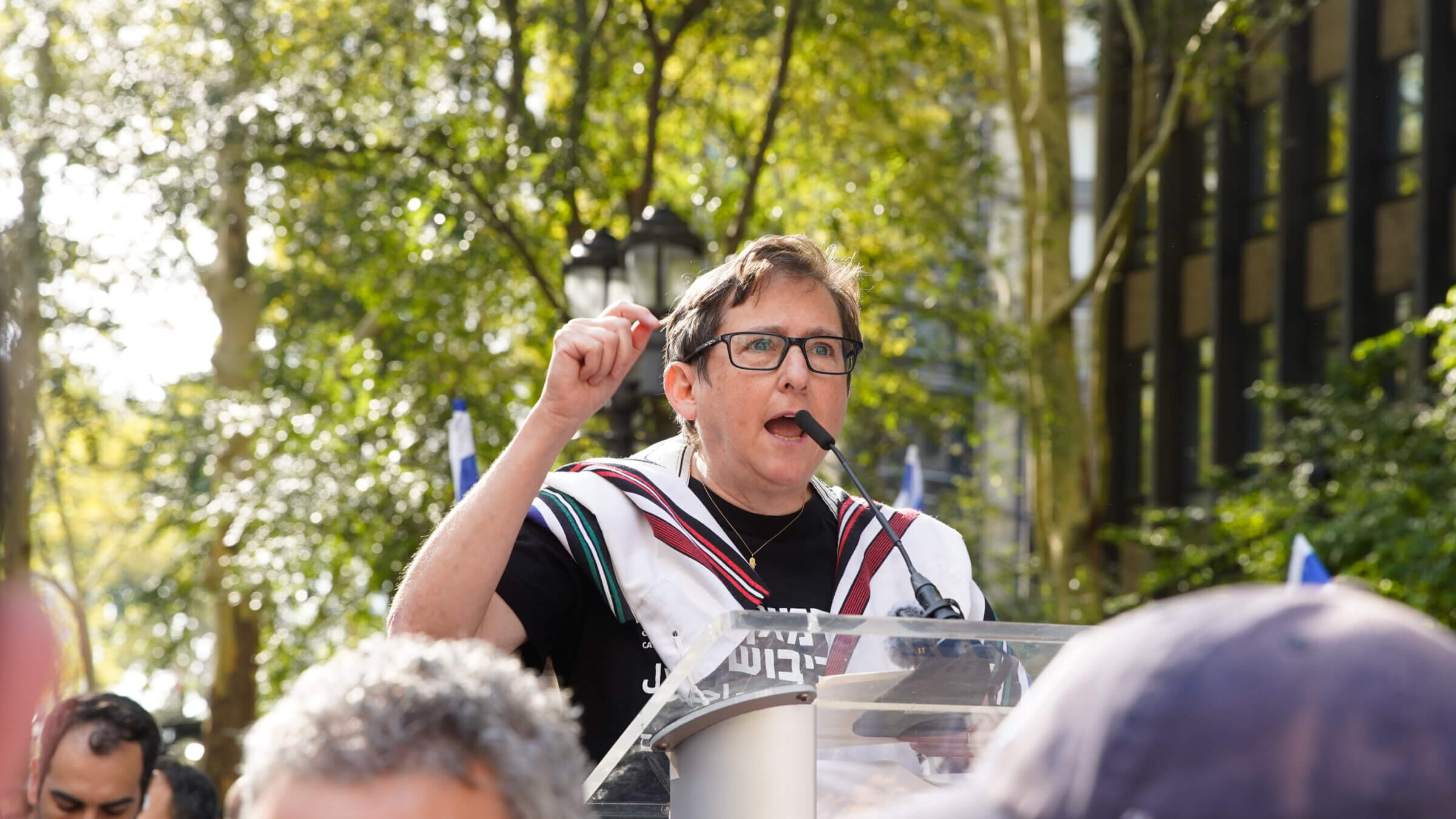
Rabbi Sharon Kleinbaum at a protest against Prime Minister Bibi Netanyahu as he addresses the UN General Assembly on Sept. 22, 2023. Photo by Rob Kim/Getty Images for New York Protest Movement
When Rabbi Sharon Kleinbaum arrived at Congregation Beit Simchat Torah 32 years ago to be its first employee, the tiny shul was already a safe haven for gay Jewish New Yorkers. But nobody at her installation ceremony could have imagined the synagogue that would emerge under her leadership.
Kleinbaum, 64, will leave her position as senior rabbi at the largest LGBTQ+ synagogue in the nation — and possibly the world — in August. At her retirement party earlier this month, speakers, including former Secretary of State Hillary Clinton, celebrated her work to better the lives of gay Jews and queer people generally — and also CBST’s projects advocating for immigrants and strengthening interfaith relations.
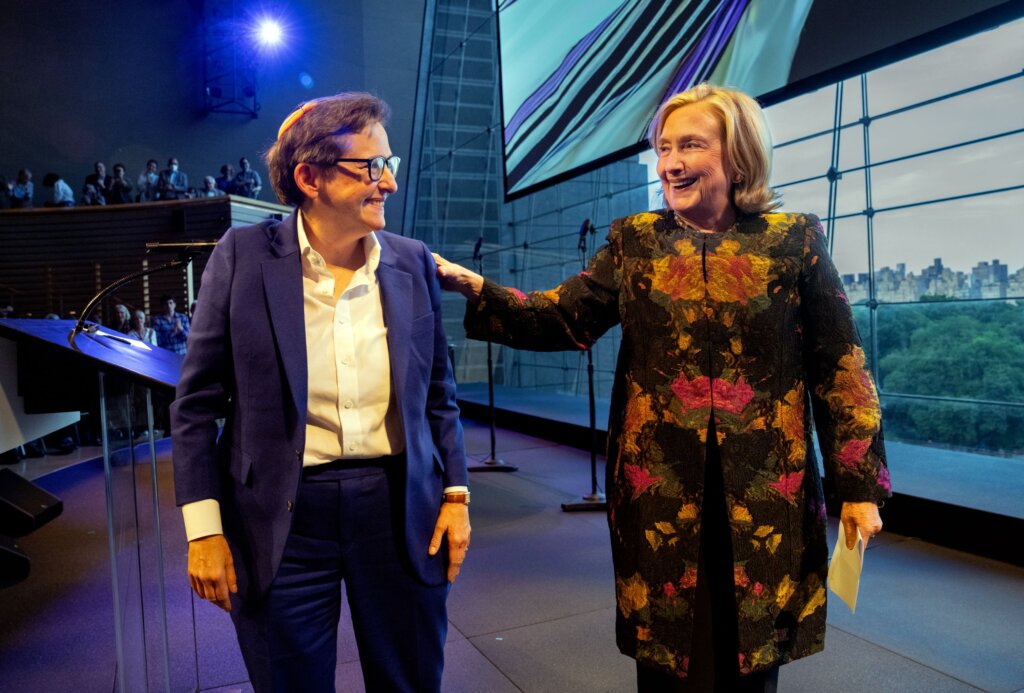
They recalled the spiritual care she gave to congregants stricken during the AIDS epidemic, when not a week went by without Kleinbaum officiating at the funeral of a young man felled by the disease.
They talked about how she put her body on the line to advance her causes. (She told me she has been arrested 20 times for her political activism, and spent a month in a federal prison.)
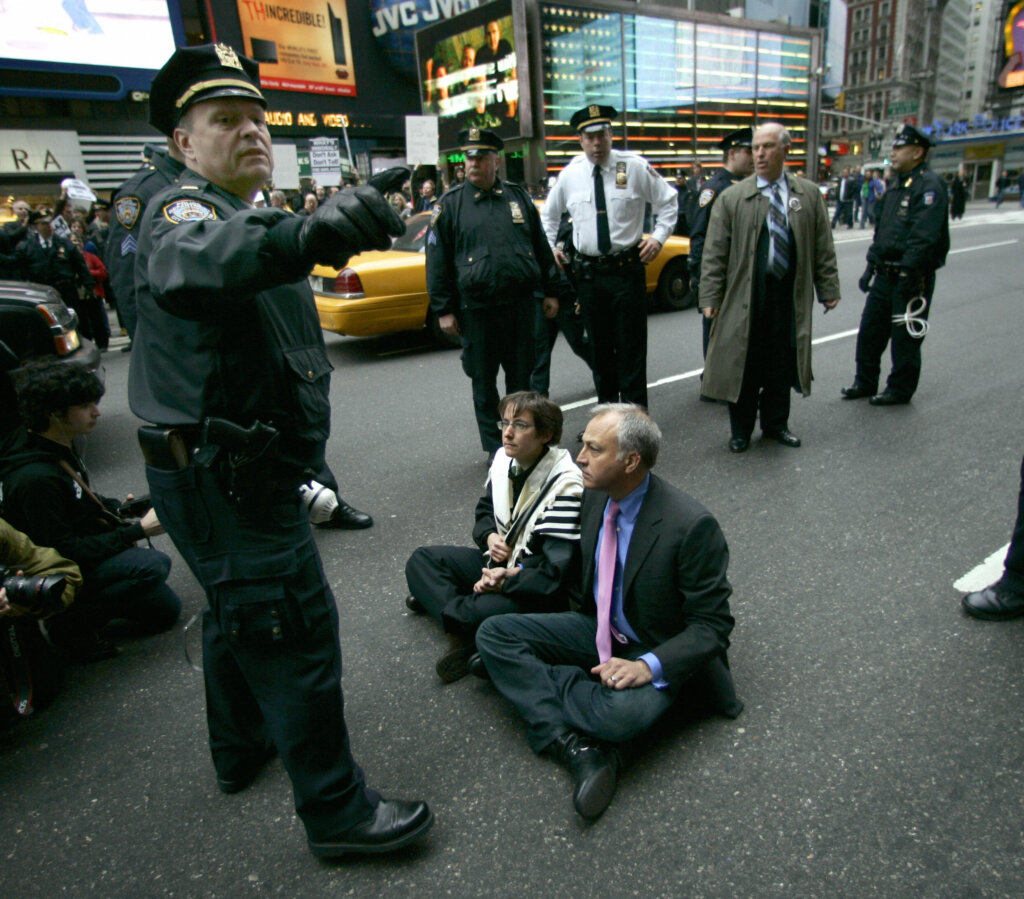
Congregant Harold Levine, a vice president of the CBST board, called her the “model of a social justice warrior.”
In 1992, when Kleinbaum first came to CBST, some of the traditionally oriented gay men who had founded the congregation in the 1970s were leery of a female rabbi, and a few left for other synagogues.
She understood. “It was hard to be gay at that time,” she said. “Many were afraid of lifting their heads above the radar.”
Her first focus at “the gay synagogue,” as it was known, was to confront the AIDS ravaging the congregation, and build what she described as “a stronger community to absorb that degree of pain.”
She estimated that 40% of CBST’s members died of AIDS.
In the late 1990s, once medical treatments for AIDS became available, Kleinbaum began realizing her larger vision for CBST: to welcome a growing and increasingly diverse congregation, to make music and the arts central to CBST’s life, and to set an ambitious social justice agenda to serve the marginalized outside its doors.
Congregants with many causes
In the beginning, CBST’s congregants prayed in a rented church sanctuary and in nondescript meeting spaces at Westbeth, a subsidized artists’ residence in Greenwich Village. Since 2016 its home has been a 17,000-square-foot modern sanctuary in a historic building on West 30th Street designed by famed architect Cass Gilbert. It now has 1,200 individual members.
When Kleinbaum came aboard, CBST had a $40,000 budget, she said, and its income and expenses were tallied on loose pieces of paper. Now the synagogue’s budget is nearly $5 million, she said. It employs a full-time staff of 25, and many more part-timers.
Early on, she and the congregation became leaders in the movement for marriage equality, making countless trips to lobby and rally in Albany and Washington. She has also led many congregant trips to Israel to advocate for gay rights and peace between Jews and Palestinians.
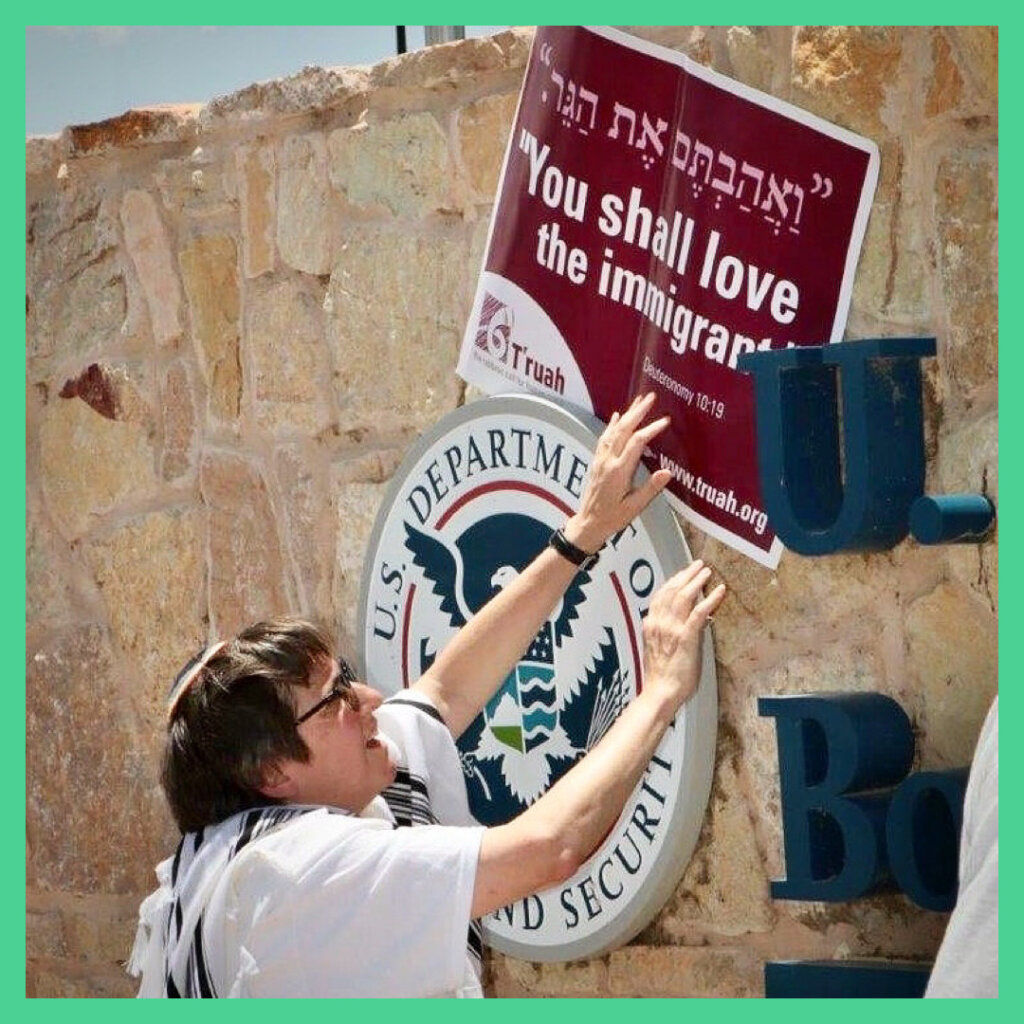
CBST is the only synagogue in the country with a legal clinic to help undocumented immigrants apply for asylum, said Noah Elias Habeeb, director of the program, called The Ark. About three quarters of those who request asylum with CBST’s help do so based on their status as LGBTQ+ or HIV-positive people facing persecution in their home country, said Kleinbaum.
Established in 2019, 100 people volunteer with The Ark. Some are attorneys and many are not, and they include both members and nonmembers of the synagogue. They have assisted some 1,900 undocumented immigrants seeking asylum, Habeeb said, and filed asylum applications for 400. Of those The Ark volunteers have helped, 40 have been granted asylum status, he said.
When former President Donald Trump implemented a “Muslim ban” as one of his first acts as president, prohibiting people from several Muslim-majority countries from coming to the U.S, Kleinbaum reached out to CBST’s Muslim neighbors at the Islamic Center at New York University.
Beginning on the Friday after Trump’s inauguration in 2017, a group from CBST headed to the Islamic Center each week to greet its congregants with flowers.
“We served Ramadan meals and learned with them,” said Levine. “They supported us too. After the Tree of Life shooting our Muslim friends came and stood in front of CBST with signs saying we stand in solidarity.”
Straight, gay, cis, trans
CBST was at the vanguard of the movement to make synagogues more inclusive of gender diversity in ways that liberal mainstream congregations have only recently embraced — like how to call someone who is non-binary to read from the Torah. Conventionally, someone is called “son of” or “daughter of.” If someone is non-binary, at CBST they can be called up “from the house of” and then their parents’ names.
“We’ve been doing that quietly for years,” said Kleinbaum. And rather than use the gendered terms bar and bat mitzvah, at CBST they are simply called “b mitzvahs.”
In 2020 CBST, under Kleinbaum, hired a social worker for elderly congregants, who more often than straight people are not married, and don’t have children or extended family to support them as they age.
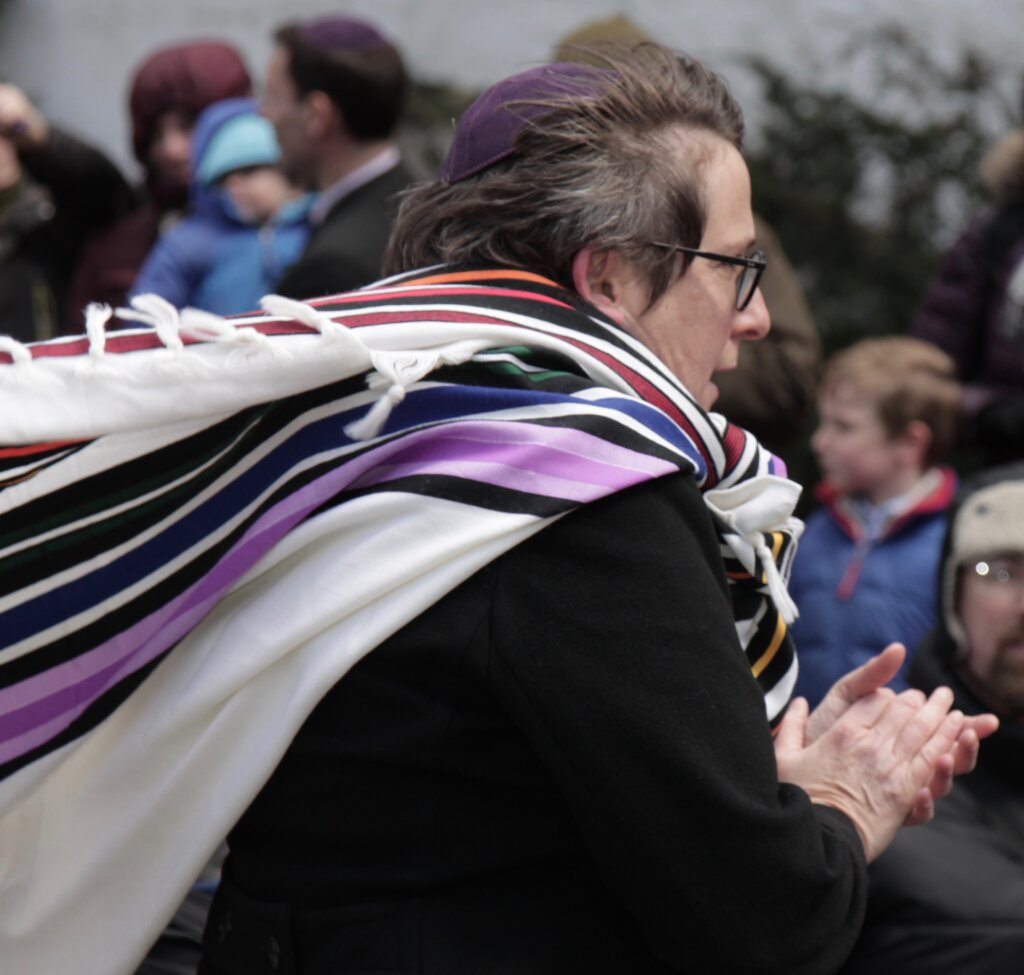
And Kleinbaum, ordained in the Reconstructionist movement in 1990, has worked to make CBST a home for those who grew up in Orthodox Judaism.
After meeting him in the back of a police van in Washington, when both were arrested in 2018 at a demonstration to support young immigrants, Kleinbaum hired a straight Haredi rabbi as the synagogue’s scholar in residence.
Rabbi Mike Moskowitz, who earned three Orthodox rabbinic ordinations at Jerusalem’s Mir yeshiva and at Beth Medrash Govoha in Lakewood, New Jersey, has focused much of his writing and work on trans rights. At CBST, he counsels LGBTQ+ people coming from Orthodox homes and their families, who often struggle to embrace openly gay relatives.
Moskowitz does much of his work behind the scenes, said Kleinbaum, talking with rabbis and other Orthodox leaders.
The synagogue does not affiliate with any denomination, and its staff and rabbinical interns come from many streams of Judaism, and represent the full range of sexual and gender identities.
“We have straight, gay, cis and trans leaders. That adds to the texture of what God wants of us as Jews,” Kleinbaum said. “It’s a profound theological statement, not just an organizational approach.”
This year marks the 30th anniversary of the Cooperberg-Rittmaster Rabbinic Internship Program Kleinbaum started, named for two longtime CBST members and gay activists. Two rabbinical interns work at CBST each year — this year, one is a student at the Reform movement’s seminary and the other is from the Reconstructionist movement. A cantorial intern is from the Conservative movement.
On Yom Kippur, CBST’s services at the Jacob Javits Convention Center attract roughly 1,500 people each year, a tradition Kleinbaum started as soon as she was hired by CBST.
“We don’t require tickets since I don’t want there to be a barrier to anyone coming,” she said.
Night of stars
Kleinbaum grew up in Rutherford, New Jersey, the youngest of four children. Her father was a Yiddish-speaking secular socialist, and her mother a Conservative Jew who kept a kosher kitchen but ate lobster out.
Kleinbaum became Orthodox while attending the Frisch School, a Modern Orthodox high school. She studied political science and took Yiddish classes at Barnard College. After her ordination, she worked at the Reform movement’s Religious Action Center in Washington, D.C., until CBST hired her two years later.
Her retirement party at Manhattan’s Jazz at Lincoln Center reflected her stature in progressive and LGBTQ+ politics, as well as her varied musical tastes.
Broadway stars Andrea Martin and Danny Burstein sang “Do You Love Me?” from Fiddler on the Roof. Founder of the Jewish Broadway Alliance Seth Rudetsky performed. A string quartet played chamber music. Metropolitan Opera soprano Toni Marie Palmertree sang an aria from Tosca.
Lesbian comic Kate Clinton was the mistress of ceremonies.
Kleinbaum’s wife, Randi Weingarten, president of the American Federation of Teachers and politically well-known in her own right, spoke, as did Kleinbaum’s two daughters from her earlier long-term partnership, to Rabbi Margaret Moers Wenig. President Joe Biden and Sen. Chuck Schumer sent congratulatory videos.
Clinton — the former presidential candidate, not the comedian — told the sold out crowd of nearly 500 people that Kleinbaum had created a “bold spiritual community of resistance and love,” and that her career “demonstrates that joy and resilience can have its roots in despair and adversity.”
The CBST community choir closed the evening singing “L’ Dor v’Dor” (Hebrew for “from generation to generation”).
Do ‘gay shuls’ still matter?
Life for LGBTQ+ Americans has radically changed since Kleinbaum’s early days at CBST. Being diagnosed with HIV is no longer an automatic death sentence. Gay marriage is now legal. Women are widely accepted as rabbis in the liberal denominations. What was once rare — gay people having children — is now commonplace. CBST now has had a Hebrew school and track for “post-b mitzvah” teenagers.
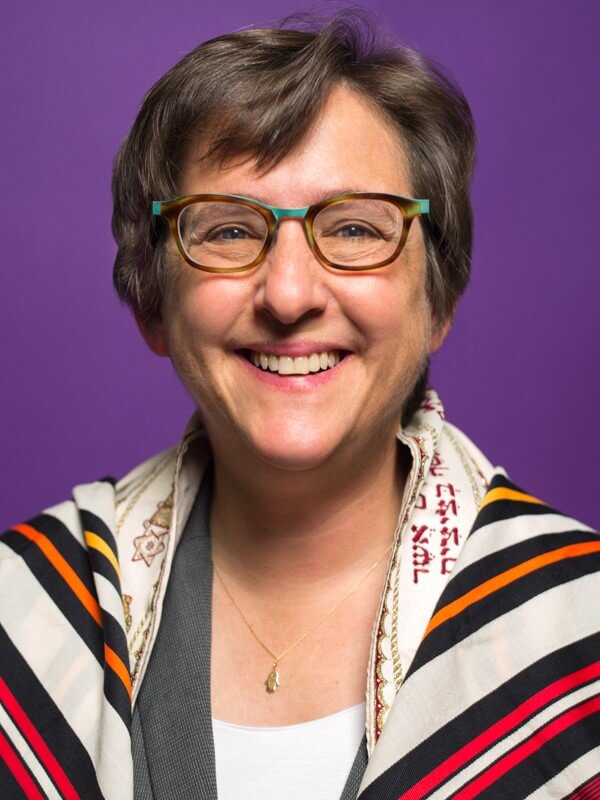
Openly gay people are no longer excluded from Jewish religious life the way they once were. While CBST was not allowed to participate in the Salute to Israel Parade for seven years (members protested their exclusion from the sidelines), since 1999 it has had a contingent marching at the annual event, like other synagogues.
So is a synagogue like CBST still necessary?
“LGBTQ people need a place to be openly gay and deeply Jewish,” especially since, in the current political climate, tolerance for gay people is far from guaranteed, said Kleinbaum.
“CBST is grounded in our deep history as a place for Jews rejected from everywhere,” she added, noting its many straight members, and that its incoming president is straight. “But the history and values of being a majority-LGBTQ+ community is at our core, and essential.”
Kleinbaum said she is looking forward in retirement to spending more time with her daughters Liba and Molly, and her grandchildren on the West Coast. She is also looking forward to being relieved of a senior rabbi’s administrative duties.
“I am ready for some open space and time to think,” she said. “I hope to work on the November election, study, write, teach, pray, walk, cook, hike, paint, schmooze, hang with friends at long leisurely laugh filled dinners, do art, travel, finally learn how to do PowerPoint, go to more theater and museums, and be open to the universe.”
CBST has hired Rabbi Jason Klein, who was the first openly gay man to head a rabbinical organization (as president of the Reconstructionist Rabbinical Association) to replace Kleinbaum, who starting Aug. 1 will become “senior rabbi emerita.”To continue her work, CBST has established the Rabbi Sharon Kleinbaum & Randi Weingarten Fund for Social Justice. It has already raised $1.2 million of its $1.5 million goal.
Correction: An earlier version of this story incorrectly stated that Rabbi Jason Klein was the first openly gay person to head a rabbinical organization. He was the first openly gay man to do so.
















